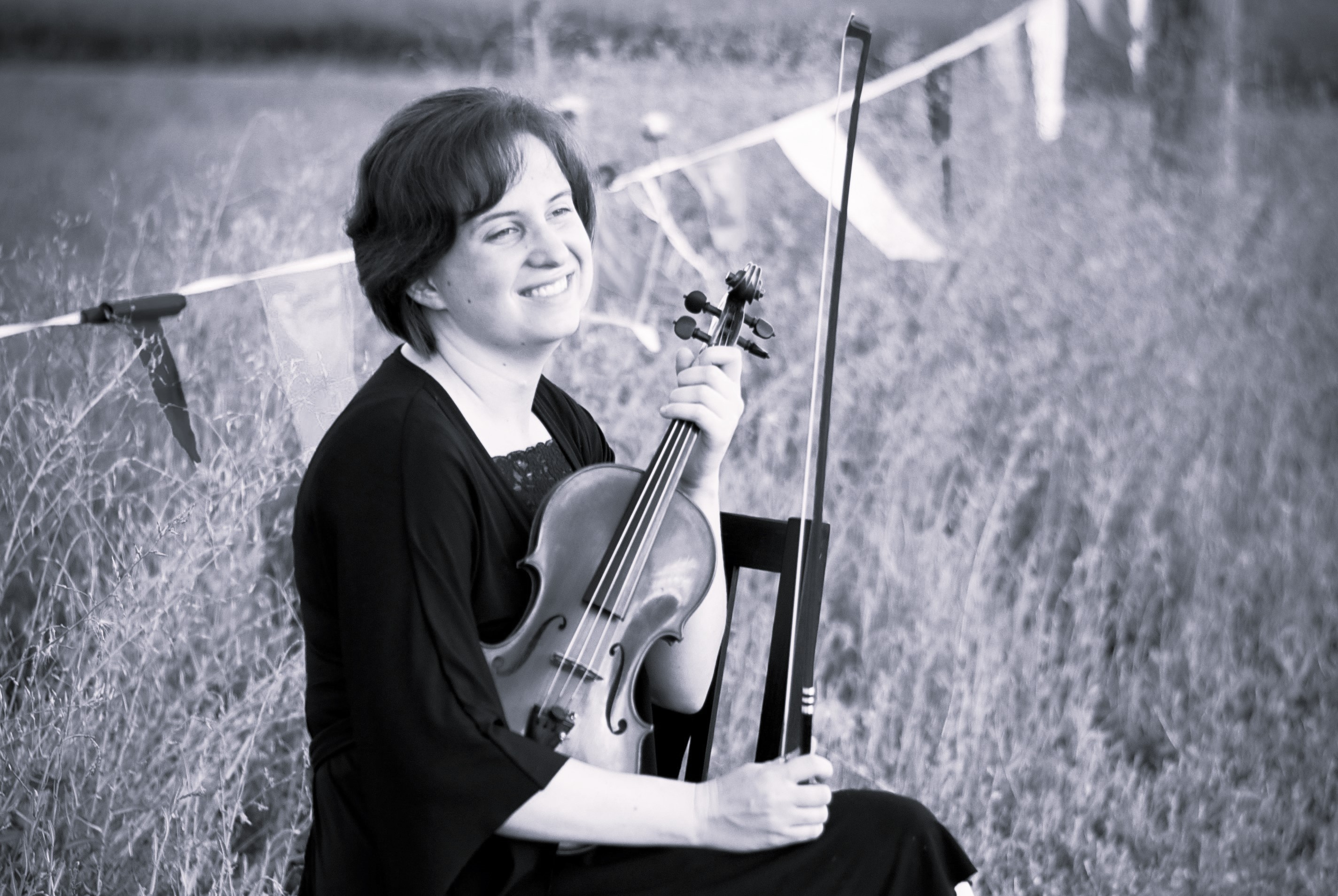Sometimes the best questions have no easy answer. Sigh. Let's talk about the elephant in the room. It's something that plagues not only musicians, but all of mankind. That is Pride! Yep, pride with a capital P--the selfish, comparison-to-others kind. I'm guilty of it. Not exactly simple to admit.
I normally am fine admitting my weaknesses. It's my way of demonstrating vulnerability and a desire to connect. But in admitting this particular weakness, I feel guilt; I believe I should know better than to indulge in pride. Pride is a stubborn root of so many vices"”the hidden part underground that we want to keep hidden. A short disclaimer: there is some religious zeal in this article. But I believe my intended audience will be able to relate.
I was told, at least in high school, by more than one of my peers in orchestra, how humble I was, presumably about my talent. That was awkward for me! I didn't know what to think. I was faced with a choice: do I agree with them so I don't imply they're liars, or do I just blush and deflect the compliment because I don't like drawing attention to myself? My reaction was always the latter, and I felt more embarrassed at my flushed cheeks (why couldn't I just say, "Thank you" and move on?).
Now those days seem long ago, and simpler somehow. Eventually, after my school days were finished, my attitude evolved, and I began to [sort of] believe my colleagues. After all, I knew them to be honest people. Why couldn't they be right? It was easier to do this when analyzing my PAST self (i.e. I used to be humble.) Nevertheless, instead of being actually humbled and grateful for their faith in me in turn, I accepted their praise as a lesser human would: hungry for flattery, focusing on myself, taking the compliment too far. If I WERE humble, it was a virtue I started to pride myself on. There's some irony there . . . ! Though recognizing the absurdity of that, today I probably would not only accept the praise if someone were to compliment me thusly . . . but I'd have to come face-to-face with an unwelcome character flaw"”that I crave and rely on the high opinion of others. WHY IS THAT??
I don't know why for sure. Perhaps some of it is the nature of violin performance"”there's a correlation between audience appreciation and future opportunities. But I think it's more than that. I admire the beauty in others and look for the same respect shown in return.
Long ago, a mentor of mine chose not to acknowledge my talents, and I felt pushed downward with his/her feedback. Worse, I was consistently blatantly ignored when I attempted to approach this individual. It was an excruciatingly long time before I was able to adequately forgive this person enough to find healing. As a very young adult, I figured, maybe my incriminating music critic was right. And I was quite discouraged. After all, this person was older and had more experience with life. Maybe my talent, that I had always considered to be an asset, was in reality a liability, the other music big-wigs who had praised me were misleading me, and as an individual, I was merely an annoyance fit to be ignored and criticized.
On the flip side, I felt the urge to prove to this musician that I actually had the talents he/she was ignoring and disparaging. In fact, I am ashamed to admit that I have wallowed in thoughts, understandably, that I am both a better violinist compared to some others, and a better person than certain "key" people treated me as. I have cared too much about others' perceptions. I too often forgot to seek the opinion of Who it was that had made it possible for me to play my violin at all!
Who could I trust to be accurate AND supportive? At my darkest moments, even God seemed to be a being with questionable motives to view from a standpoint of antagonistic resentment. Ironically, I focused on the disdain of my distant and "more seasoned" critic, as well as my own inner critic, more than I trusted in God's support. I am not proud of this.
Preoccupation with the injustice of one's presumed ranking in the world is a bitter place to be in. I don't like to stay there too long . . . though some of my frustration and efforts to self-inflate my own ego in reaction to this situation did lend energy to my resolve to keep on swimming.¹ Sometimes this Band-Aid of "confidence" kept me going, whilst at other times, I confess with guilt that my preoccupation with certain relationships, and a lack of approval from them, has distracted me from appreciating the significant opportunities I have been blessed with. These blessings included my testimony of my faith, a loving family, and unique musical opportunities (even those that no one else knew about, cared about, or remembered!) that really seemed custom-tailored to my talents and my ability to appreciate. It wasn't until much later that I learned to say, "So?" in response to criticism, take their opinion as just one opinion among many others, and find real confidence; and joy. This likely did not originate from justifying my own talents, but from working on them and exploring them for my own self-satisfaction. And from the Lord's blessing. I have two violin students in particular to thank for their examples in practicing almost exclusively for the sake of personal enjoyment and improvement. I'm often motivated by the chance to perform for others, partly because they offer appreciation for what I'm doing. That's usually a win-win situation, and I'm not saying wanting an audience is bad. But letting what others think trump your own dignity or common sense, whether you allow your self-esteem to be shattered or to be puffed up, is where things get dicey.
Another aspect of merely competing with others, even inwardly: I sometimes still slip and covet opportunities I don't have. The danger of focusing on what I lack is in forgetting to feel grateful for what wonderful opportunities I have been offered, including the warm kindness, forbearance, generosity, and appreciation I have been shown from 95% of the people I know!!
I'm willing to learn. Not one of us is completely right all the time, since our vision is limited, and on the flip side, we're also not inherently wrong! Life is just ridiculous sometimes!
Even when I falter and have suffered because of a few individuals' apparent disdain, neglect, or other unexplained choices, I've observed that most imperfect God-fearing people are worth learning from. Though we all share the tendency toward pride, we're each different in terms of strengths, weaknesses, etc. God made us different.² And we all have different experiences to pull from, that influence our manner. Perhaps that's partly the point: once I tolerate others having a different, more trying or exasperating manner or opinion, I'm more inclined to extend the same grace to myself"”to allow myself to think differently. In so doing, I can allow myself to be potentially wrong, haha. Who knows the answer to who is "more right" in their point of view or actions, or if it even matters in terms of our eternal priorities? Obviously God does, so I'll just trust He knows what to do with that. I am prone to want to stay curious without staying distraught. I can always try to do better at being a peacemaker in the meantime.
1 Disney's Finding Nemo
2 Reflecting on "Different is Good" 1994 Arby's Restaurant campaign here

Cami Shaskin
Violin Blog
About
Updates
Quick Access
Archive
2021
Jan
2022 16 - Welcome to My Blog
23 - Violin Teaching Kits
Feb 06 - Valuable Techniques
07 - From the Top
20 - Violin Jokes
Mar 06 - Singing in Orchestra
13 - Nurtured by Love
21 - Helpful Websites
27 - Unique Case Uses
Apr 10 - All About Tone
24 - Teaching Values
May 02 - Believing Teachers?
29 - Our Quartet
Jun 26 - Violin Bridge Tips
Jul 07 - Clever Violin Memes
20 - Horses and Lions
Aug 04 - Music During Covid
16 - Favorite Music
Sep 12 - Being There
Oct 16 - Sight Reading Tips
Nov 05 - Why It's the Frog
Dec 20 - Bach on the Brain
30 - Impact for Life
Jan
Jul
Aug
Oct
Nov
2023 23 - Tendonitis Helps
Feb 21 - An Old Performance
Mar 23 - Cars3 & Coaching
Apr 29 - Preferred Brands
May 27 - Love: A Calling
JunJul
Aug
08 - Music Opens Doors
SepOct
Nov
27 - Useful Analogies
Dec 28 - A Humorous Anecdote
Jan
Feb
May
Jun
Aug
Oct
Nov
2024Feb
15 - Our Commonality
Mar 10 - Extras
18 - Autopilot
AprMay
Jun
06 - Motivation
JulAug
26 - The Ink
SepOct
Nov
26 - Music Copyright
Dec Jan
Mar
Sep
2025 15 - Fame and Fortune
FebMar
14 - Intermission
Apr 18 - A Day in the Life
May 02 - Oops!
Jun 14 - A Science or an Art?
Jul 15 - A Difficult Post
AugSep
20 - Anxiety Interview
Oct 02 - Sounds of Italy
Nov No posts to display.
Dec No posts to display.
Jan
Feb
Aug
2026Feb
No posts to display.
Mar No posts to display.
Apr 17 - Bittersweet Moments
May No posts to display.
Jun No posts to display.
JulAug
No posts to display.
Sep No posts to display.
Oct 31 - My Video Series
Nov No posts to display.
Dec No posts to display.
Jan
07 - Food in Twinkle?
Feb No posts to display.
Mar No posts to display.
Apr No posts to display.
May No posts to display.
Jun No posts to display.
Jul No posts to display.
Aug No posts to display.
Sep No posts to display.
Oct No posts to display.
Nov No posts to display.
Dec No posts to display.
Posts
A Difficult Post
| Love it | Interesting | Inspiring | Want to share |
 |
 |
 |
 |
| 0 | 0 | 0 | 0 |
Like this post? Link back to it later by copying the URL below.
© 2021-2026 All Rights Reserved
This content has been proven to be completely dairy-free, gluten-free, sugar-free, and made from code not treated with rBST. No animals were harmed in the making of this blog. The views presented do not necessarily represent the views of Ms. Shaskin's neighbors, kin, the U.S. government, or a mysterious worldwide network of musicians. Any reproduction, retransmission or reposting of content without crediting the author (basically me) is prohibited. Free Wi-Fi not included. If this is a life-threatening emergency, close your browser and dial 911.



